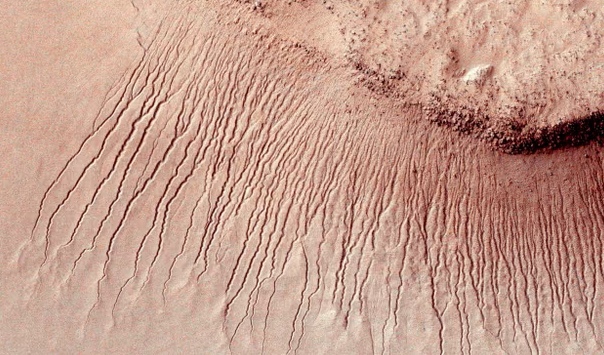A study released on Monday based on data from NASA’s Mars InSight rover shows the presence of liquid water far below the fourth planet’s surface, advancing the search for life there and revealing what may have happened to Mars’ ancient oceans, Reuters reports.
The Mars InSight Lander touched down on the planet’s surface in 2018 and recorded shaking of the Martian crust with a seismograph until the end of 2022, staying in the same place.
The researchers concluded from this data that there is likely liquid water deep beneath the Earth. Water is considered essential for life, and geological studies show that there were lakes, rivers and oceans on the planet’s surface more than 3 billion years ago. One of the authors, Vashan Wright of the University of California San Diego’s Scripps Institution of Oceanography, said:
“On Earth what we know is where it is wet enough and there are enough sources of energy, there is microbial life very deep in Earth’s subsurface. The ingredients for life as we know it exist in the Martian subsurface if these interpretations are correct.”
The study found that large reservoirs of liquid water in cracks at depths ranging from 11.5 kilometres (7.15 miles) to 20 kilometres below the surface best explain the InSight measurements.
The authors note that the predicted volume of liquid water beneath the surface “exceeds the volumes of water thought to have filled hypothetical ancient Martian oceans.” Wright said:
“On Earth, groundwater infiltrated from the surface to deep underground. We expect this process to have occurred on Mars as well when the upper crust was warmer than it is today.”
There is no way to directly study the water so deep beneath the surface of Mars, but the authors say the findings “have implications for understanding the water cycle of Mars, determining the fate of surface water in the past, searching for past or existing life, and evaluating the use of in situ resources for future missions.”
The study, whose other authors are Matthias Morzfeld of the Scripps Institution of Oceanography and Michael Manga of the University of California, Berkeley, was published on August 12 in the journal Proceedings of the National Academy of Sciences. Wright also said:
“I’m inspired and I hope the public is also inspired. Humans can work together to put instruments on a planet… and try to understand what’s going on there.”
